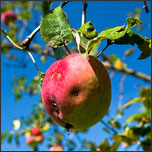How to Prevent Apple Pests and Diseases

Are you tired of biting into one your apples to find worms?
Do you want to know how to keep your apples disease free?
With fall in the air, here at Rootwell, we have been looking into fall’s favorite treat, the apple. Growing apples can save you money and provide your family healthy fruit. However, with growing apples comes pests and diseases and to spray pesticides seems to defeat the purpose of growing your own fruit in the first place. Today, we are going to discuss different diseases and pests and how to prevent them.
The Apple Scab
According to Better Homes and Gardens, the apple scab is most likely to grow in areas with cool and west spring weather. It looks like olive-brown spots on your leaves and fruit. Some ways to prevent apple scab:
- Clean up all the fallen leaves in the fall.
- You can select apples that are scab resistant such as Liberty or Honey Crisp.
- Lastly, when the first flower buds begin you can use liquid-sulfur sprays,
Cedar-Apple Rust
This will cause your apples to have pale yellow spots of surface of their leaves and fruits. The yellow spots will grow, turn orange, and tiny black dots will show up. You can prevent cedar-apple rust by:
- First you can pick apples that are rust resistant.
- In the spring, you can spray your apples with a liquid-sulfur
- Lastly, remove any junipers in the nearby area.
Apple Maggot
These maggots are larvae that burrow into the apple. Theses larvae will cause the apples to drop early. Two ways to keep your apples maggot free:
- Every week in the summer, pick up any and all fallen apples and destroy them.
- Set up apple-maggot traps in your apple tree to catch the adult moths.
Codling Moth
Have you ever seen fruit with small holes? This is caused by the codling moth, and while it is a common insect, its larvae feed on your trees fruit. Prevent it by:
- Two weeks after the petals drop from their blossoms, spray a natural bacterium Bt.
Remember, if you want to grow your apples organically you can. You do not have to spray. Overall, organically grown apple trees will produce enough apples that can be eaten and they just may have a few superficial spots on them. If you would like to spray, most garden center have spays that you would apply up to 4 times a year.

